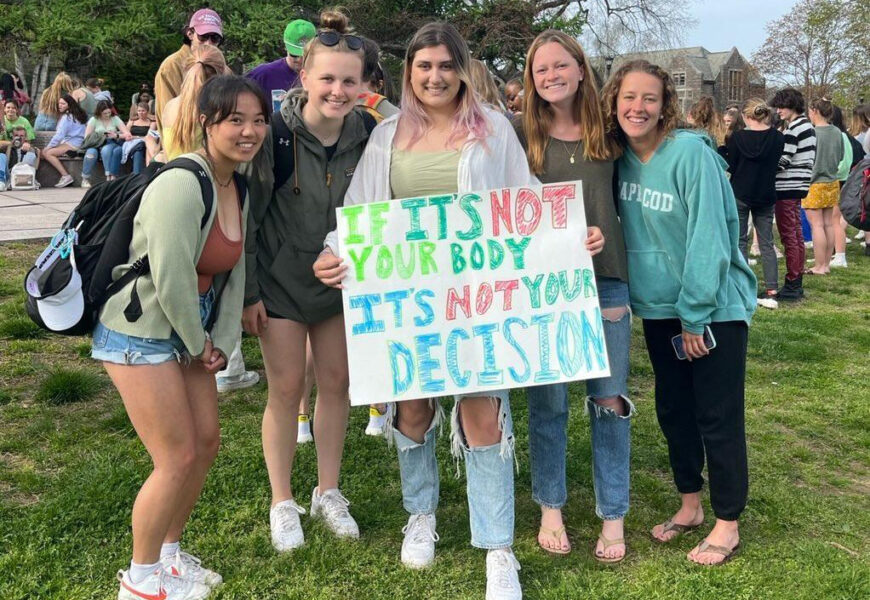Photo courtesy of Jimmy Cork ’22.
“Students have a lot of collective power, but no one teaches us how to harness it,” says Grace Rathbun ‘22. As a student, Rathbun is a Gender, Sexuality, and Intersectionality major; PICA scholar; and recent DIEI awardee. Many might not know that this year, she also helped to found the Connecticut College Feminist Coalition. On May 5, the group organized a campus rally for reproductive freedom.
The Williams College Center for Intersectional Feminism messaged the CC Feminist Coalition via Instagram on Tuesday May 3, and said they were organizing a multi-college demonstration in response to the Supreme Court document leak regarding the overturning of Roe v. Wade. Soon after, student leaders from 21 colleges and universities across 12 states—including UC Berkeley, Brown, and Georgetown—met over Zoom to discuss logistics. It was that 5 pm on May 5 would be the walkout time across colleges.
Organizing is not glamorous work. Most of the tasks that went into bringing this protest to fruition was sending emails, which the Feminist Coalition spent hours doing in the library with the intent to get the word out and find speakers. They also spent hours making posters for students to carry during the protest. The day of the walkout, student leaders tabled outside of the library to further inform the campus community about the walkout.
On the day of the walkout, students gathered at Tempel Green, marched to the library, then entered the library for five minutes of silence to reflect the five decades of the existence of Roe v. Wade. After this, the group mobilized to Crozier Williams Student Center to listen to speakers. Professor of GSIS Karen Hanna, adjunct Professor of GSIS Luciana Quagliato, a trio from CCEmpower, and other students delivered remarks, performed a monologue, and read poems to a crowd of protestors. “It was inspiring to see such a good turnout, and gives me a lot of hope that the next generation of Conn students is going to be really active and hopefully stay mobilized,” says Rathbun.
Media attention was a central goal for student leaders across colleges. The Hill, ABC7, and various other small outlets reported on the reproductive rights walkout to varying degrees. Bloomberg News was also in contact with student organizers. A person goal for the CC Feminist Coalition was to demonstate solidary and raise visibility. “Young people won’t stand for this,” said Rathbun.
Rathbun says she “planted the seed” for the coalition, but does not run it. She reached out to Intro to GSIS classes for potential members, and together they worked as a collective to establish structure, values, and goals. Thus, leadership is horizontal and this semester has seen five active members who include, along with a co-organizer of the rally: Leila Merhi ‘25, Miranda Jackel ‘25, Ana Flood ‘25, Abby Dawson ‘25, and Mia Dalton ‘23.
“It starts with us spreading our message, making the campus community aware, and getting wider media attention on ourselves to raise further awareness across the country. This is an attack on everybody’s bodily autonomy, and we wanted to stress the importance of this issue, while also making space for Conn students to mobilize and heal as a community,” emphasizes Merhi.
The voices of young people, college students in particular, are often overlooked. The gap that the CC Feminist Coalition hopes to fill on campus is student activism and explicitly intersectional feminism. A defining trait of the Coalition is that it is not an identity based group; anyon can be feminist. Groups like Women in STEM, Women in Politics, and CCEmpower are all gendered, but even so, “are not explicitly feminist in name or function,” says Rathbun. While the group put a lot of energy this year into getting established, their ultimate goal is to give students a space to tap into their collective power.
There are many definitions of feminism out there, and various conflicting ideas might come to mind when students hear “feminist coalition.” Rathbun cites bell hooks when asked about the definition of feminism by which the group abides: feminism is not about equality, but dismantling systems and institutions that uphold patriarchy and misogyny. The group does not only focus on women’s or gender based issues, but any and all issues that pertain to collective liberation. Fellow leader Miranda Jackel says feminism is not a set of issues, but the perspective with which issues are analyzed.
Hopefully, this event has shown students collective power exists when people organize, and they can affect change about campus issues when they all come together. “The protest is only the beginning,” says student leader Merhi.










